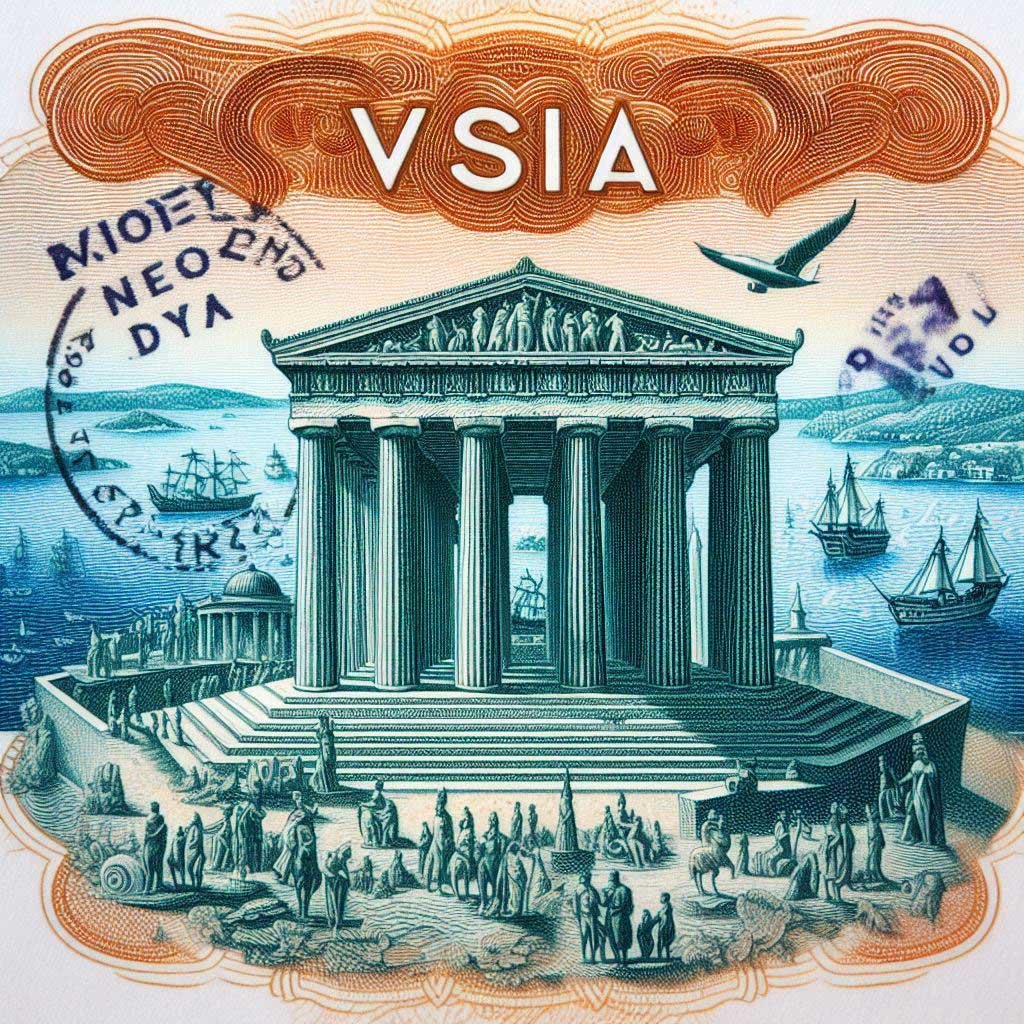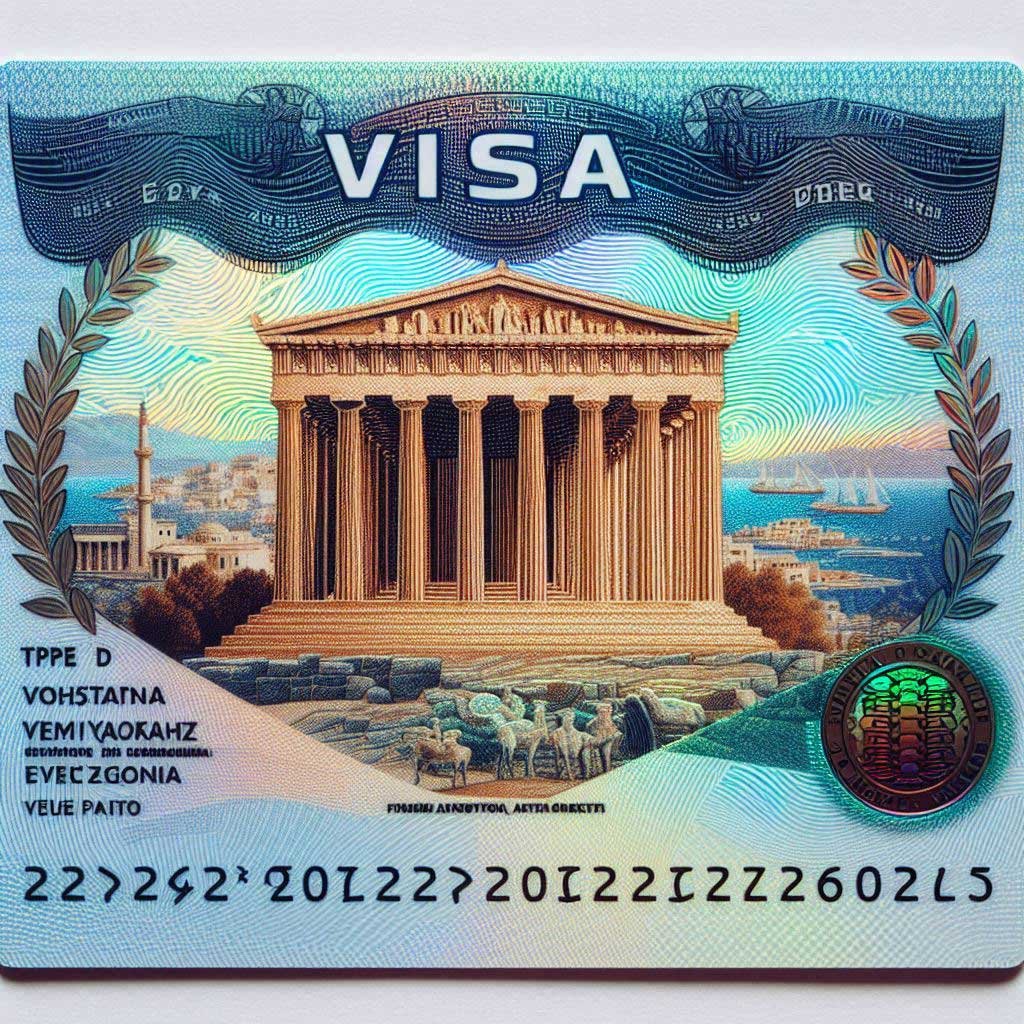Introduction to the Type D Visa in Greece
The Type D visa, also known as a national visa, is essential for individuals planning long-term stays in Greece. This visa is designed for various purposes, including employment, academic pursuits, and family reunification. Unlike short-term Schengen visas, the Greece Type D visa allows for an extended stay, typically exceeding 90 days, making it a crucial requirement for those intending to integrate more deeply into Greek society.
Primarily, the Type D visa serves those who have secured job offers in Greece, wish to enroll in educational institutions, or need to join family members residing in the country. It is an indispensable legal requirement to ensure that your stay in Greece is legitimate and uninterrupted. This visa provides the legal framework that facilitates your prolonged presence, ensuring compliance with Greek and EU regulations.
In 2024, several updates and amendments have been introduced to the Type D visa application process. These changes aim to streamline the procedure, making it more efficient and accessible for applicants. Important updates include enhanced digital application platforms and revised documentation requirements, reflecting Greece’s commitment to aligning with broader EU visa policies.
Understanding the intricacies of the Greece Type D visa is essential for a successful application. Staying informed about the latest guidelines and procedural adjustments can significantly impact the approval process. Whether you are moving to Greece for work, education, or to be with family, familiarizing yourself with these updates will help ensure a smooth transition and a legally sound stay.

Eligibility Criteria for a Type D Visa
To be eligible for a Type D visa in Greece, applicants must fulfill several specific requirements. The criteria are designed to ensure that individuals have a legitimate reason for their long-term stay and are capable of supporting themselves financially during their time in Greece. One of the primary criteria is age; applicants must generally be at least 18 years old. However, exceptions exist for specific visa categories, such as those related to education or family reunification.
Financial stability is another crucial factor. Applicants must demonstrate that they have sufficient funds to support themselves throughout the duration of their stay. This can be proven through bank statements, sponsorships, or employment contracts that specify income. The exact financial requirements may vary depending on the purpose of stay and the applicant’s country of origin.
The purpose of stay plays a significant role in determining eligibility. Common reasons for applying for a Type D visa include employment, education, family reunification, and retirement. For employment visas, applicants must have a job offer from a Greek employer and meet any professional qualifications required for their position. Educational visas require proof of enrollment in a recognized Greek educational institution. Those applying for family reunification must provide documentation proving their relationship with the family member residing in Greece.
Eligibility criteria can also vary based on the applicant’s country of origin. Citizens of the European Union (EU) and European Economic Area (EEA) countries are subject to different rules compared to non-EU/EEA nationals. Non-EU/EEA nationals must typically provide additional documentation, such as criminal background checks or health insurance, to support their application.
Understanding these eligibility criteria is essential for anyone considering a long-term stay in Greece. By meeting these requirements, applicants can ensure a smoother process in obtaining their Greece Type D visa, setting the foundation for a successful and legally compliant stay in the country.

Required Documents and Attachments
Applying for a Greece Type D visa requires meticulous attention to detail, as the completeness and accuracy of your documents are crucial for the success of your application. Here’s a comprehensive list of the necessary documents and attachments you will need to submit:
1. Passport Copies: Ensure your passport is valid for at least three months beyond your intended stay in Greece. You will need to provide copies of the identification page and any pages with visas or stamps. It is advisable to have extra copies on hand.
2. Visa Application Form: Complete the Greece Type D visa application form with precision. Double-check all information for accuracy, as inconsistencies can lead to delays or rejections. This form can typically be downloaded from the official embassy website.
3. Proof of Financial Means: Demonstrating your financial stability is essential. Provide bank statements, payslips, or other financial documents that show you have sufficient funds to cover your stay in Greece. This proof should reflect your ability to meet living expenses, accommodation, and any other costs associated with your purpose of stay.
4. Health Insurance: Comprehensive health insurance coverage is mandatory. Your policy should cover medical expenses and repatriation, with a minimum coverage of 30,000 euros. It’s prudent to get insurance that also covers COVID-19 related expenses.
5. Purpose-Specific Documents: Depending on your reason for staying in Greece, additional documents will be required:
- Employment: A valid employment contract or a letter from your employer in Greece.
- Education: An acceptance letter from a recognized Greek educational institution.
- Family Reunification: Documents proving family relationships, such as marriage or birth certificates.
It is recommended to start gathering these documents well in advance to ensure you have ample time to collect any additional paperwork that might be needed. Organize your documents in a clear and logical order, making it easier for the consular officers to review your application. Additionally, always provide original documents along with certified translations if they are not in Greek or English.
By following these guidelines and preparing your documents thoroughly, you will enhance your chances of a successful Greece Type D visa application, ensuring a smoother process ahead.
Application Process Step-by-Step
Applying for a Greece Type D visa involves a series of well-defined steps, each critical to ensuring a smooth and successful application. The process begins with thorough research and preparation. Prospective applicants should first gather detailed information about the specific visa requirements, which can be found on the official Greek consulate or embassy websites. This research phase is crucial to understanding the necessary documentation, eligibility criteria, and any special conditions that may apply.
Once the research is completed, the next step involves the collection of required documents. Typically, this includes a valid passport, recent passport-sized photographs, proof of financial stability, health insurance, and any other documents specific to the purpose of the stay (such as an acceptance letter from a Greek educational institution or a work contract). It is important to ensure that all documents are up-to-date and meet the specified guidelines to avoid any delays.
After assembling the necessary documents, applicants must fill out the visa application form. This form can usually be downloaded from the consulate’s website or obtained directly from the consulate. Careful attention should be paid to accurately completing all sections of the form. Once the form is completed, an appointment must be scheduled with the nearest Greek consulate or embassy for the submission of the application and documents.
During the appointment, applicants will typically be required to attend an interview. This interview serves to verify the authenticity of the provided information and to assess the applicant’s intent and eligibility for the Type D visa. It is advisable to be well-prepared for the interview, bringing all necessary documents and being ready to answer questions related to the purpose of the stay and the applicant’s background.
Following the interview, there may be a waiting period while the application is processed. The typical timeline for processing a Greece Type D visa can range from a few weeks to several months, depending on various factors such as the applicant’s nationality and the volume of applications being handled by the consulate. Applicants should be aware of any visa fees that may apply, as these are usually required at the time of application submission.
In case additional information or documentation is needed, the consulate will reach out to the applicant. It is important to respond promptly to any such requests to avoid further delays. Once the visa is approved, the applicant will be notified and can then proceed to collect their visa.

Common Challenges and How to Overcome Them
Applying for a Greece Type D visa can be a complex and daunting process, often fraught with common challenges that can delay or hinder the approval of your application. One frequent issue is the submission of incomplete or incorrect documentation. Missing documents or errors in the submitted forms can result in significant delays or outright rejections. To mitigate this, it is crucial to thoroughly review and double-check all required documents before submission. Utilize checklists provided by the Greek consulate or embassy to ensure no essential paperwork is overlooked.
Another prevalent challenge is misunderstanding the specific requirements for the Greece Type D visa. Requirements can vary based on the purpose of the stay, such as work, study, or family reunification. Misinterpretation of these criteria can lead to the submission of incorrect information. To avoid this, applicants should meticulously read the guidelines available on official government websites or seek clarification from the visa office. Engaging with forums or communities where past applicants share their experiences can also provide valuable insights.
Delays in processing times can be another significant hurdle. These delays can be due to high application volumes, incomplete applications, or administrative backlogs. To navigate this issue, applicants should apply well in advance of their intended travel date. Monitoring the status of the application through official channels and maintaining regular communication with the visa office can also help in preempting and addressing any unforeseen delays.
Finally, language barriers can present challenges, especially when dealing with official documentation or communicating with Greek authorities. If language proficiency is an issue, seeking assistance from professionals such as immigration consultants or legal advisors who specialize in Greek visa applications can be beneficial. These professionals can provide guidance and ensure that all documentation is accurately completed and submitted.
By proactively addressing these common challenges, applicants can significantly improve their chances of successfully obtaining a Greece Type D visa, ensuring a smoother and more efficient application process.
Receiving Your Type D Visa and Next Steps
Once your application for a Greece Type D visa has been approved, you will receive a notification from the relevant Greek consulate or embassy. This notification often includes instructions on how and when to collect your visa. Typically, you will need to visit the consulate or embassy in person to retrieve your passport with the visa sticker affixed. It is crucial to bring a valid ID, as well as any additional documents the consulate may request, such as proof of payment for visa fees.
Upon receiving your Type D visa, the next step involves preparing for your journey to Greece. Ensure that your travel documents, including your passport with the visa, travel insurance, and any required vaccinations, are in order. It is also advisable to book your flight and accommodation in advance, keeping in mind the initial validity period of your visa.
Understanding the rights and responsibilities that come with your Greece Type D visa is essential. This visa allows you to stay in Greece for an extended period, typically for purposes such as work, study, or family reunification. During your stay, you must adhere to Greek laws and regulations, including those related to employment, education, and residency. It is also important to note that this visa permits you to travel within the Schengen Area for short stays, provided that your primary residence remains in Greece.
Upon arrival in Greece, one of the critical steps is to register with the local authorities. This process often involves visiting the local municipality or the Aliens and Immigration Department, where you will need to present your passport, visa, and any other required documentation. Registration is essential for obtaining a residence permit, which is a prerequisite for accessing various services, such as healthcare and social security.
In preparation for your new life in Greece, familiarize yourself with the local culture, language, and customs. Consider enrolling in Greek language courses and seeking information about the local community and resources available to newcomers. These steps will help ensure a smooth transition and a positive experience during your stay in Greece.
Living in Greece with a Type D Visa
Living in Greece with a Type D visa opens up a myriad of opportunities and experiences. The first step in settling down is finding suitable accommodation. Whether you prefer to rent an apartment in bustling Athens or a quaint house in a serene village, various property rental websites and local real estate agents can facilitate the process. It’s essential to understand local rental agreements, which typically require a deposit and a signed contract.
Understanding local laws and customs is crucial for integrating smoothly into Greek society. Greece is known for its rich history and cultural heritage, so familiarizing yourself with traditions and social norms will enhance your experience. For instance, Greeks value family ties and social gatherings, and showing respect for these customs can help in building rapport with locals.
Accessing healthcare is another vital aspect of living in Greece. The country boasts a well-established healthcare system, with public and private options available. As a Type D visa holder, you should ensure you have appropriate health insurance, which might be a prerequisite for your visa. Public healthcare services are generally free or low-cost for residents, while private healthcare offers more flexibility but at a higher price.
Integrating into Greek society can be an enriching experience. Learning the language, even at a basic level, can significantly improve your daily interactions and help in forming connections. Numerous language schools and online courses can assist you in this endeavor. Additionally, participating in community events, local clubs, and social activities can foster a sense of belonging and help build a support network.
Building a support network is essential for making the most of your stay in Greece. Expat communities, both online and offline, can provide valuable advice and companionship. Engaging with local residents and other expatriates can offer insights into the best places to visit, dine, and enjoy the local culture.
In conclusion, living in Greece with a Type D visa can be a rewarding experience if you are well-prepared. By understanding accommodation options, local laws, healthcare services, and integrating into society, you can make the most of your time in this beautiful country. Embrace the adventure, and Greece will surely offer a memorable and fulfilling stay.
Renewal and Extension of a Type D Visa
Renewing or extending a Type D visa in Greece is a crucial process for individuals who wish to prolong their stay beyond the initial validity period. The process involves several steps and specific conditions that must be met to ensure compliance with Greek immigration regulations. Understanding these guidelines can help streamline the renewal or extension process and avoid potential pitfalls.
Firstly, it is essential to determine whether your current Type D visa qualifies for renewal or extension. Typically, visas can be renewed or extended if the purpose of stay remains valid and the applicant continues to meet the eligibility criteria. For instance, students must still be enrolled in their educational institution, and employees must retain their employment status. Applicants should prepare to submit updated documentation to reflect their ongoing eligibility, such as enrollment certificates, employment contracts, or proof of continued financial support.
The necessary documentation for renewing or extending a Type D visa includes a completed application form, a valid passport, recent passport-sized photographs, and proof of residence in Greece. Additionally, applicants may need to provide proof of health insurance, financial stability, and any other relevant documents that support the reason for the visa extension. These documents must be submitted to the appropriate immigration authority within Greece.
Timing is a critical factor in the renewal or extension process. It is advisable to initiate the application at least 60 days before the current visa expires. This timeline allows sufficient time for processing and addresses any potential issues that may arise. Failing to apply within this window may result in legal complications or even the rejection of the visa extension request.
Potential challenges in the renewal or extension process include delays in document processing, incomplete applications, or changes in eligibility status. To mitigate these risks, applicants should ensure all paperwork is accurate and complete, seek assistance from immigration consultants if needed, and maintain open communication with the relevant authorities.
By adhering to these guidelines and preparing thoroughly, applicants can navigate the renewal or extension of their Greece Type D visa with greater ease and confidence, ensuring a smooth transition for their continued stay in the country.



6 Responses
this is very useful
thank you for this full guide
Thank you dear Alexander
I believe that is one of the so much vital info for me.
And i’m satisfied reading your article.
Thank You!
I am UK national & have been offered a job in a British International Preschool in Athens. I would like to know which ‘subcategory’ I must fill in when applying for my D visa. I’m finding it very confusing & do not want to make a mistake.
Dear Lynne
For mor information you can call our Athens office +30 (210) 723 4444 our send us email to info@stargategroup.gr
Thank You